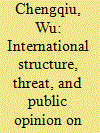|
|
|
Sort Order |
|
|
|
Items / Page
|
|
|
|
|
|
|
| Srl | Item |
| 1 |
ID:
107288


|
|
|
|
|
| Publication |
2011.
|
| Summary/Abstract |
In the first decade of the 21st century, United States foreign policy developed a dramatic trajectory, undergoing a unilateralist turn under President George W. Bush and a multilateralist turn under President Barack Obama.1 Under the Bush administration, the United States not only withdrew from or undermined such multilateral international treaties as the Kyoto Protocol, the Rome Statute establishing the International Criminal Court, the Biological Weapons Convention, and the Chemical Weapons Convention, but also disregarded collective security mechanisms and multilateral international organizations to pursue its own security agenda by invading Iraq in 2003 without explicit authorization from the United Nations. In contrast, under the Obama administration, the United States on the one hand restored its relations with European allies, Russia, Latin American countries, and the Islamic World, and on the other promoted soft diplomacy with regards to various global issues, including the recent financial crisis, climate change, and nuclear proliferation. The contrast is even more telling when we juxtapose the two presidents' National Security Strategy documents. The Bush administration adopted in September 2002 a new national strategy allowing for pre-emptive strikes, whereas the Obama administration's National Security Strategy released in May 2010 emphasized building US economic strength at home and shaping the international order through engagement with other countries in order to strengthen international institutions and galvanize collective action.2 According to Obama's document, while 'the United States must reserve the right to act unilaterally if necessary', it 'will draw on diplomacy, development, and international norms and institutions to help resolve disagreements, prevent conflict, and maintain peace, mitigating where possible the need for the use of force.'3
What were the causes of Bush's turn to a unilateralist foreign policy approach and Obama's turn to a multilateralist one? To my knowledge, no study explains the two foreign policy changes under
|
|
|
|
|
|
|
|
|
|
|
|
|
|
|
|
|
|
|
|
|